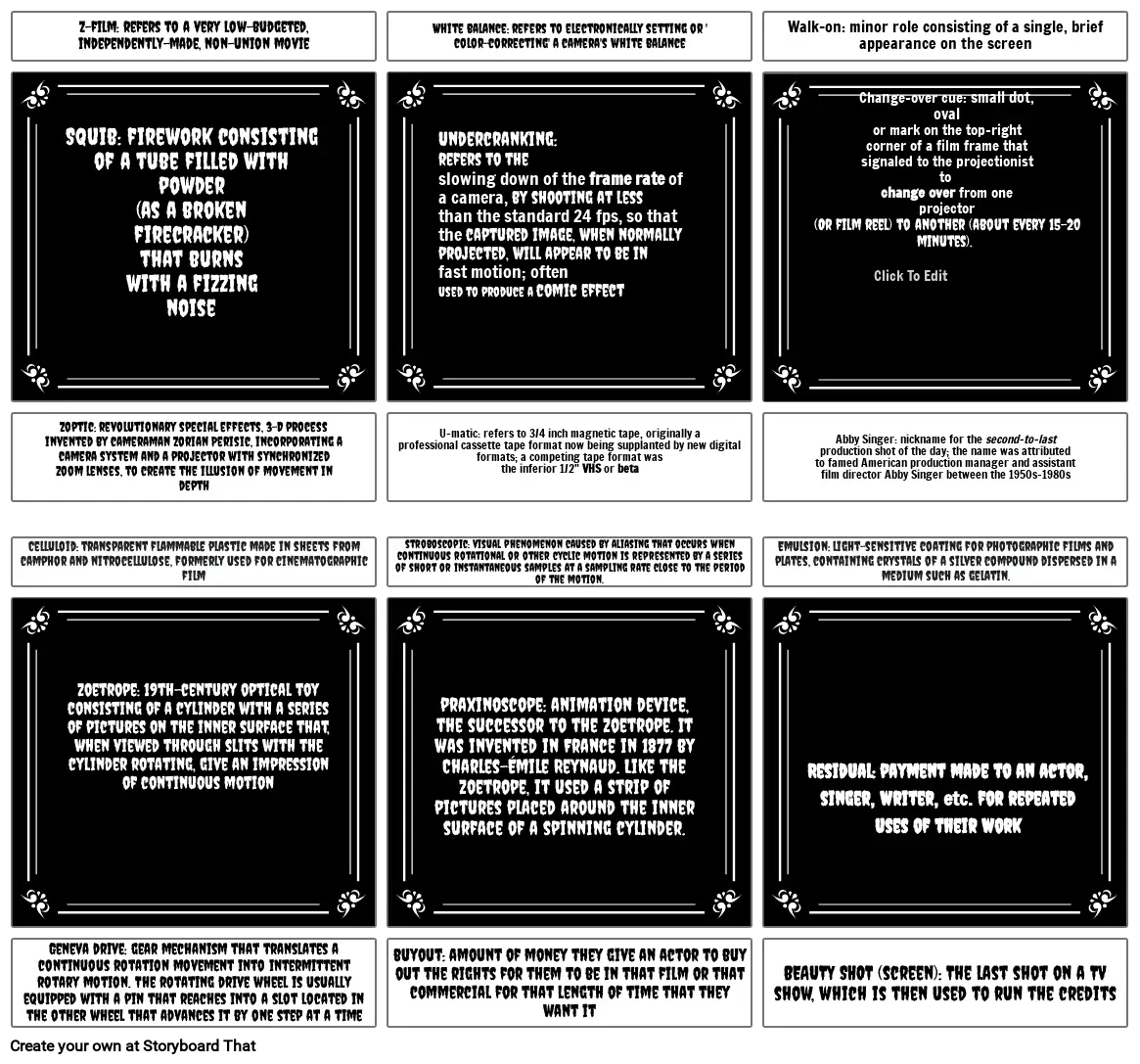Movie Vocabulary

Storyboard Text
- Z-film: refers to a very low-budgeted, independently-made, non-union movie
- Squib: firework consisting of a tube filled with powder (as a broken firecracker) that burns with a fizzing noise
- White balance: refers to electronically setting or 'color-correcting' a camera's white balance
- Undercranking: refers to theslowing down of the frame rate of a camera, by shooting at lessthan the standard 24 fps, so that the captured image, when normally projected, will appear to be infast motion; often used to produce a comic effect
- Walk-on: minor role consisting of a single, brief appearance on the screen
- Change-over cue: small dot, oval or mark on the top-right corner of a film frame that signaled to the projectionist to change over from one projector (Or film reel) to another (about every 15-20 minutes). Click To Edit Help Insert ParagraphUndoes the last commandRedoes the last commandTabUntabSet a bold styleSet a italic styleSet a underline styleSet a strikethrough styleClean a styleSet left alignSet center alignSet right alignSet full alignToggle unordered listToggle ordered listOutdent on current paragraphIndent on current paragraphChange current block's format as a paragraph(P tag)Change current block's format as H1Change current block's format as H2Change current block's format as H3Change current block's format as H4Change current block's format as H5Change current block's format as H6Insert horizontal rulelinkDialog.show Summernote 0.8.11 · Project · Issues
- Zoptic: revolutionary special effects, 3-D process invented by cameraman Zorian Perisic, incorporating a camera system and a projector with synchronized zoom lenses, to create the illusion of movement in depth
- Celluloid: transparent flammable plastic made in sheets from camphor and nitrocellulose, formerly used for cinematographic film
- zoetrope: 19th-century optical toy consisting of a cylinder with a series of pictures on the inner surface that, when viewed through slits with the cylinder rotating, give an impression of continuous motion
- U-matic: refers to 3/4 inch magnetic tape, originally a professional cassette tape format now being supplanted by new digital formats; a competing tape format was the inferior 1/2 VHS or beta
- stroboscopic: visual phenomenon caused by aliasing that occurs when continuous rotational or other cyclic motion is represented by a series of short or instantaneous samples at a sampling rate close to the period of the motion.
- praxinoscope: animation device, the successor to the zoetrope. It was invented in France in 1877 by Charles-Émile Reynaud. Like the zoetrope, it used a strip of pictures placed around the inner surface of a spinning cylinder.
- Abby Singer: nickname for the second-to-lastproduction shot of the day; the name was attributed to famed American production manager and assistant film director Abby Singer between the 1950s-1980s
- Emulsion: light-sensitive coating for photographic films and plates, containing crystals of a silver compound dispersed in a medium such as gelatin.
- Residual: payment made to an actor, singer, writer, etc. for repeated uses of their work
- Geneva drive: gear mechanism that translates a continuous rotation movement into intermittent rotary motion. The rotating drive wheel is usually equipped with a pin that reaches into a slot located in the other wheel that advances it by one step at a time
- buyout: amount of money they give an actor to buy out the rights for them to be in that film or that commercial for that length of time that they want it
- BEAUTY SHOT (screen): The last shot on a TV show, which is then used to run the credits
Over 30 Million Storyboards Created
No Downloads, No Credit Card, and No Login Needed to Try!
